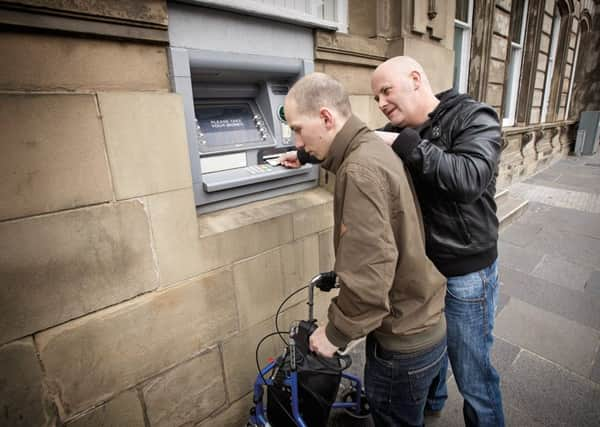Adult harm: '˜It is vital to raise concerns and safe to do so'


The Scottish Government’s “Seen Something? Say Something?” campaign aims to highlight some of the forms adult harm can take in a bid to help people spot the signs and situations that could mean a person is at risk.
Adult harm doesn’t have to be physical. Verbal threats or ridicule can cause psychological harm, failing to dress, wash or eat properly can be signs of neglect and becoming tearful when their relationship is mentioned could suggest sexual harm.
Advertisement
Hide AdAdvertisement
Hide AdFinancial harm, particularly to elderly or vulnerable adults is a real problem and one which must be stopped.
When an 80-year-old widow from Edinburgh asked her neighbour to drive her to the bank to withdraw money to pay for gardening work, he became suspicious that something was not right.
He knew that she employed her own gardener so was surprised to hear she owed money to someone else.
She explained that two men in a white van had approached her in the street saying they were on the way to her house to cut her trees. Although she was confused by this, she agreed to them cutting the tops of her trees.
Advertisement
Hide AdAdvertisement
Hide AdAfter completing the work the men asked her to pay £3,000 which she had written a cheque for.
When the workmen later returned to her home, they explained that the cheque had bounced and she offered to go to the bank and withdraw the funds for them.
Her neighbour realised this didn’t feel right and advised her that this was far too much to pay. When the men came back to collect the cash he called the police and reported the incident.
Police and trading standards officers made inquiries in the neighbourhood only to discover that a number of residents had been approached in a similar manner.
Advertisement
Hide AdAdvertisement
Hide AdAs a result of the neighbour alerting police, leaflets about bogus workmen and doorstep crime were circulated in the area while GPs, nursing and home help staff were asked to report any suspicious activity.
In another case, the daughter of an 84-year-old woman who suffered from dementia was found to be stealing money from her mother’s bank account.
When the woman’s bank reported unusual activity on the account, an adult support and protection inquiry was launched.
“These examples show the different forms adult harm can take and how communities can play an important role in getting vulnerable adults help,” says Paul Comley, adult support and protection co-ordinator at WithScotland, a national resource for professionals working with adults at risk.
Advertisement
Hide AdAdvertisement
Hide Ad“Sometimes people don’t want to get involved for fear of being seen to intrude in other people’s lives.
“Or they are worried they might be wrong about the situation and their actions will result in another person being unfairly accused.
“But it is vital to raise concerns and it is safe to do so. The local social work department will check the situation sensitively and support will be given if needed.”
If you think an adult is at risk of harm and may need help, call your local social work department for advice.
Warning signs
Advertisement
Hide AdAdvertisement
Hide AdAdult harm can take many forms and there are some key signs to look out for:
• Physical: cuts or bruises that can’t be properly explained, hiding injuries, or refusing to talk about them, appearing fearful or withdrawn.
• Psychological: being verbally bullied, ridiculed, ostracised and threatened with violence. It can also include people taking advantage or someone who is unable to stick up for themselves, for example “freeloading”, persistently “hanging out” at their house or involving them in illegal or socially unacceptable activity.
• Neglect: failing to dress, wash or eat properly, becoming socially isolated or leaving people who need help unattended and uncared for.
Advertisement
Hide AdAdvertisement
Hide Ad• Financial: giving money to a stranger or someone they know for reasons that concern you, being unclear or confused about where their money has gone or being stressed about money issues or debt.
• Sexual: being sexually harassed or intimidated, appearing nervous or withdrawn and becoming tearful or upset when their relationship is mentioned.
Social Care Direct, Edinburgh: 0131 200 2324
For more information visit actagainstharm.org